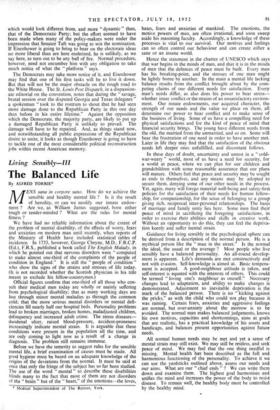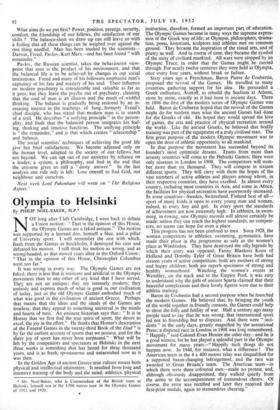Living Sensibly—Ill
The Balanced Life
By ALFRED TORRIE*
Mr ENS sana in corpore sano. How do we achieve the sensible and healthy mental life ? Is it the result of heredity, or can we modify our innate endow- ment? Are we, as William James suggested, born either tough or tender-minded ? What are the rules for mental fitness ?
We have had no reliable information about the extent of the problem of mental disability, of the effects of worry, fears and anxieties on modern man until recently, when reports of the Ministry of Health have included statistical tables of incidence. In 1733, however, George Cheyne, M.D., F.R.C.P. (Ed.), F.R.S., published a book called The English Malady, in which he pointed out that nervous disorders were "computed to make almost one-third of the complaints of the people of condition in England." It is still the "people of condition" who show the signs of the strains and stresses of life today. (It is not recorded whether the Scottish physician in his title meant to exclude his fellow-countrymen.) Official figures confirm that one-third of all those who con- sult their medical men today are wholly or mainly suffering from psychological disability; that as many working days are lost through minor mental maladies as through the common cold; that the more serious mental disorders or mental defi- ciencies fill nearly half our hospital beds. Personality problems lead to broken marriages, broken homes, maladjusted children, delinquency and increased adult crime. The stress diseases— duodenal ulcer, raised blood-pressure, accident-proneness increasingly indicate mental strain. It is arguable that these conditions were present in the population all the time, and are only coming to light now as a result of a change in diagnosis. The problem still remains immense.
Before we have the temerity to suggest rules for the sensible mental life, a brief examination of causes must be made. All good hygiene must be based on an adequate knowledge of the origins of the deviations from the normaL It must be said at once that ,only the fringe of the subject has so far been studied. The use of the word. " mental " to describe these disabilities blinds many to the fact that most of them are not disorders of the " brain " but of the "heart," of the emotions—the loves.
* Medical Superintendent of The Retreat, York.
hates, fears and anxieties of mankind. The emotions, the motive powers of man, are often irrational, and soon sweep aside his reasoning faculty. Accordingly, a knowledge of these processes is vital to our survival. Our motives and feelings can so often control our behaviour and can create either a sane or an insane world.
Hence the statement in the charter of UNESCO which says that war begins in the minds of men, and that it is in the minds of men that the defences of peace must be built. Every man has his breaking-point, and the stresses of one man might be lightly borne by another. In the main a mental life lacking balance results from the conflict brought about by the com- peting claims of our different needs for satisfaction. Every man's needs differ, as also does his power to bear stress— whether inner conflict or the strains of an unsatisfactory environ- ment. Our innate endowments, our acquired character, the strength of our needs and the value we place on them, all determine our power to bear conflict and to make sense of the business of living. Some of us have a compelling need for physical satisfactions and for the kind of peace of mind that financial security brings. The young have different needs from the old, the married from the unmarried, and so on. Some will bear the frustration of one need in order to have another met. Later in life they may find that the satisfaction of the obvious needs left deeper ones unfulfilled, and discontent follows.
In these days of doubt, uncertainty and unrest in a " cold- war-weary " world, most of us have a need for security, for a world at peace, where we can plan for our children and grandchildren with some reasonable assurance that our plans will mature. Others feel that peace and security may be sought as ends in themselves, and any means may be adopted to secure them, denying some of our other needs in the process. Yet, again, many will forego material well-being and safety-first policies for the satisfaction of their needs for human fellow- ship, for companionship, for the sense of belonging to a group. giving rich, reciprocal inter-personal relationships. The basis of marriage and family unity lies here. Some men find their peace of mind in sacrificing the foregoing satisfactions, in order to exercise their abilities and skills in creative work. Without an opportunity to do this, they can feel the depriva- tion keenly and suffer mental strain.
Guidance for living sensibly in the psychological sphere can be derived from a description of the normal person. He is a mythical person like the "man in the street." Is the normal the ideal, the usual or the average ? Most people who live sensibly have a balanced personality. An all-round develop- ment is apparent. Life's demands are met constructively and not with evasion. Self-knowledge is aimed at. Basic tempera- ment is accepted. A good-neighbour attitude is taken, and self-interest is equated with the interests of others. This could be termed "loving one's neighbour as oneself." Necessary changes lead to adaptation, and ability to make changes is demonstrated. Adjustment to inevitable deprivation is the mark of the demonstrated.. person. There is no "kicking against the pricks," as with the child who could not play because it was raining. Certain fears, anxieties and aggressive feelings are normal, but over-anxiety about the morrow is to be avoided. The normal man makes balanced judgements, knows his own motives, capacities and shortcomings, aims at goals that are realistic, has a practical knowledge of his assets and handicaps, and balances present opportunities against future needs.
All normal human needs may be met and yet a sense of mental strain may still exist. We may still be restless, and seek peace of mind. We may feel that the one thing needful is missing. Mental health has- been described as the full and harmonious functioning of the personality. To achieve it we can use the yardsticks outlined above, assess our needs and our aims. What are our "chief ends " ? We can write them down and examine them. The highest goal harmonises and unifies the mind and increases the power of the body to resist disease. To remain well, the healthy body must be controlled by the healthy mind. What aims do we put first? Power, position, prestige, security, comfort, the friendship of our fellows, the satisfaction of our skills ? The balance-sheet we draw up can still leave us with a feeling that all these things can be weighed over against the one thing needful. Man has been studied by the scientists— Darwin, Freud, Pavlov, Karl Marx—and has been found "with remainder."
Pavlov, the Russian scientist, takes the behaviourist view- point that man is the product of his environment, and that the balanced life is to be achieved by changes in our social institutions. Freud and many of his followers emphasise man's captaincy of his fate and mastery of his soul. Their influence on modern psychiatry is considerable and valuable as far as it goes, but they leave the psyche out of psychiatry, claiming that the soul of man is an illusion and the result of wishful thinking. The balance is gradually being restored by an in- creasing interest in the teachings of Jung, formerly Freud's chief disciple, who has stated that modern man is in search of a soul. He describes "a unifying principle" in the person- ality, and finds that the balanced person integrates his feel- ing, thinking and intuitive functions. The unifying principle is "the remainder," and is that which creates " relationship " and balance.
The social scientists' techniques of achieving the good life give but brief satisfactions. We become adjusted only on the human level, adapted to the society of our fellows but not beyond. We can opt out of our anxieties by reliance on a leader, a system, a philosophy, and find in the end that the universe gives us still a "dusty answer." In the last analysis one rule only is left: Lose oneself to find God, our neighbour and ourselves.
Next week Lord Pakenham will write on "The Religious A sp ect ."



































 Previous page
Previous page